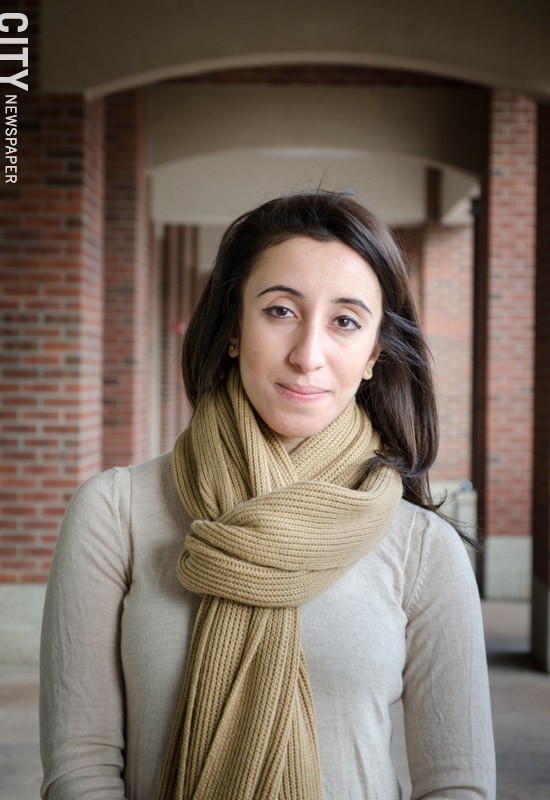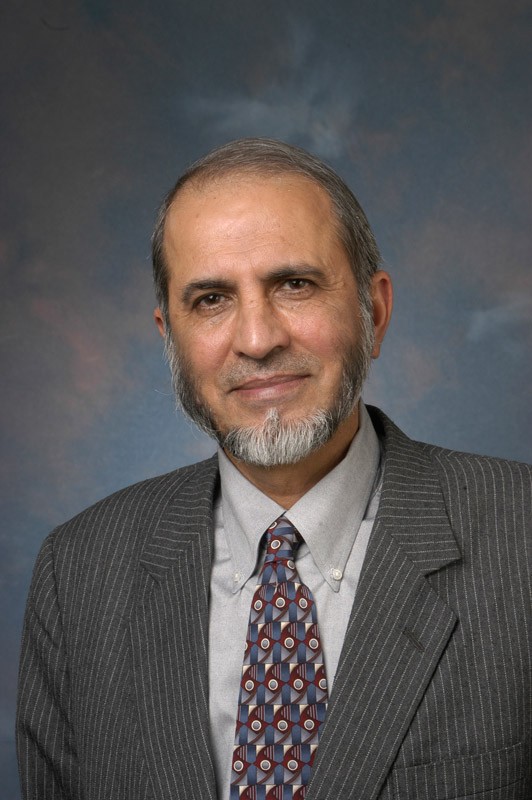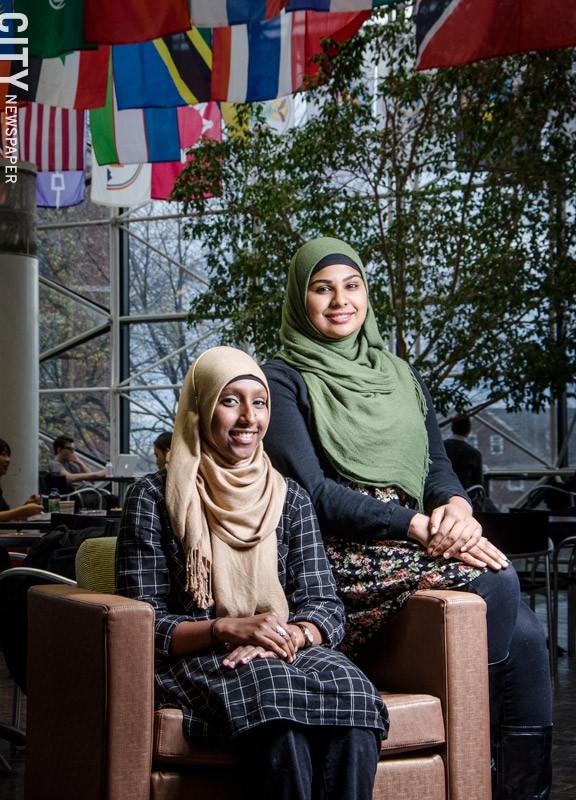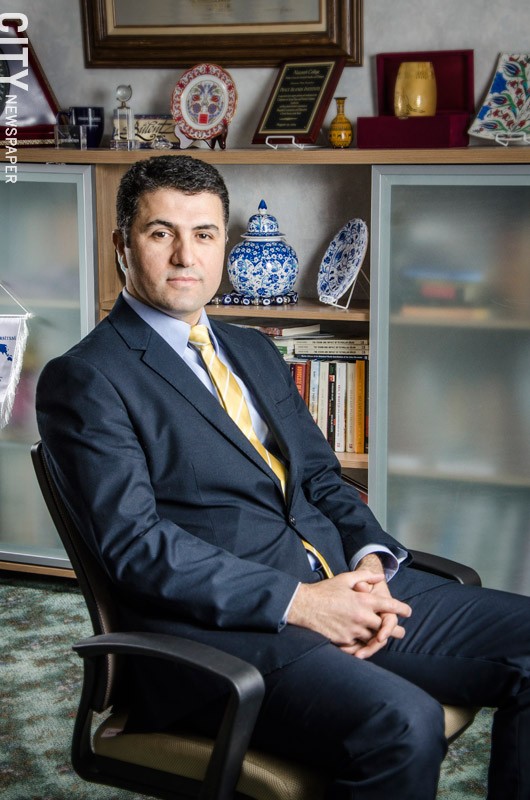The horrific attacks in Paris, the suicide bombings in Beirut, and the downing of a Russian airliner all point to something bordering on the existential.
If some people found comfort in the belief that ISIS can't cause chaos and destruction well beyond Iraq and Syria, they've been violently disabused of that notion.
And with some people, the Paris attacks have also raised fundamental questions about whether Islam truly is a peaceful religion that has been co-opted by a few radical groups, or if it's something much darker.
Embedded in all of this seems to be growing anti-Muslim sentiment. Hate crimes have declined in recent years in all of the categories that the FBI tracks, except for hate crimes against Muslims. That category is ticking upward.
Even though thousands of Americans lost their lives in the nightmarish events of September 11, 2001, that day forever changed the lives of Muslims living in the US, too.
And more than 10 years later, after US wars in Iraq and Afghanistan, the rise of ISIS, the mass migration of Syrians, and now the attacks on Paris, a steady wave of news, much of it negative, involving Muslims is the new normal.
Since the US Census doesn't collect data on religions, estimates of the number of Muslims living in the US range from fewer than two million to as many as seven million, according to a 2011 report from the Council on Foreign Relations. But almost everyone agrees that the number is growing rapidly, which is helping to fuel concerns about accepting Syrian refugees.
All Muslims are obviously not the same and there isn't a single experience that defines them. But several Muslims living in the Rochester area reveal interesting and at times troubling experiences. Rochester is for the most part a welcoming city, they say, but this is a precarious and challenging time.
While most of the public's attention is directed at the conflicts abroad, the Rochesterians say, many Muslims face a less understood struggle at home. Many say that they are deeply hurt and offended by the disturbing portrayals of their culture, and that they feel compelled to wage their own quiet public relations campaign to reassure the broader public that they have nothing to fear from them.
But some say finding that acceptance is challenging and that they expect it to remain that way for years to come.

- PHOTO BY MARK CHAMBERLIN
- Iman Abid
Iman Abid: Paris aftershocks
The recent terrorist attacks in Paris haven't crushed Iman Abid's spirit, but she says that she is wearier than she has been in a long time. And she's afraid.
Seeing how well coordinated the attacks were and how the violence continued to unfold in Paris and its northern suburb shocked Abid, a young Rochester Muslim who identifies as a first-generation Palestinian-American.
"It hits close to home," she says. "It's Paris. It's France. The French have been one of our closest allies."
But she says that after processing what happened, she knew what the Paris attacks would mean to Rochester's Muslim community.
"I'm so incredibly disappointed," Abid says. "Yet again you have to explain to people the difference between extremism and Islam."
She says it feels like a question that will never go away.
"Over and over again you have to explain, 'It's not the Islam I practice, and it's not the Islam my parents practice,'" she says. "We're Muslims, and even we don't know what this is."
She's also concerned and deeply saddened, she says, by the government officials who, after Paris, refuse to accept Syrian refugees.
"We are not representing what this country was founded on and what it represents to the rest of the world," she says. "These people are trying to escape. They're coming from an area that is so violent that they're fleeing with the clothes on their back. We should be welcoming them."

- PHOTO PROVIDED
- Muhammad Shafiq
Muhammad Shafiq: Muslims in Rochester
Muhammad Shafiq, who is executive director of Nazareth College's Hickey Center for Interfaith Studies and Dialogue, says there are between 19,000 and 21,000 Muslims in the Rochester region. And the Muslim community in Rochester reflects the larger US and Western European community in the sense that it is ethnically and racially diverse, he says.
The major Muslim communities in Rochester "are the Indo-Pakistanis and South Asians," Shafiq says. "But there are many Turkish, Somali, African American, and even Bosnian Muslims in this area, too, with many of the communities having their own mosques."
Most Muslims in Rochester, he says, are not insular and tend not to concentrate in a single neighborhood. And even though Muslims new to the US have often filled low-skilled jobs such as taxi drivers and custodians, he says, there is a strong cultural emphasis on education and entrepreneurship.
"Muslims are generally well educated," Shafiq says. "They are doctors, attorneys, electrical engineers; they are well represented in almost every field."
Iman Abid: The American dream
When Ahmed Mohamed, 14, was arrested and suspended last September after bringing a homemade clock to school as part of a science project, the saga re-ignited a national debate about Islamophobia.
The Texas high school student was suspected by law enforcement and some school officials of a possible terrorist act because some of them thought the clock resembled a bomb. Mohamed's treatment sent a chill through Muslim communities throughout the US, including Rochester.
Many seriously questioned the view that average Americans have of Muslims.
"It really hit me," Iman Abid says. She grew even more concerned, she says, when she saw that anti-Muslim rallies were planned in some cities as a result of the Texas incident.
"It started to terrify me in a way, because I asked myself, 'Are there really this many people who really want to do this?'" she says.
Abid says she decided to do what she could to dispel fears and shatter stereotypes that seem to shade at least some people's images of Muslims and Islam. She didn't want what Mohamed experienced in Texas to happen to a young Muslim student here, she says, or for anti-Muslim rallies to occur in front of Rochester's mosques.
Abid, who was born and raised in Henrietta, says that sharing her experiences about Muslim life in Rochester may be the best way to advocate for peace, understanding, and greater acceptance.
A recent graduate of Rochester Institute of Technology, Abid is also president of Monroe County Young Democrats. Like many young American Muslims, she says that the world she's grown up in is completely different from the one her parents knew.
"I grew up with two parents who have been raised in villages where the mosques were a huge social part of the community," she says. "I think the biggest difference between me and my parents was that I wasn't born into that. I grew up in a Rochester suburb with all kinds of people."
She was raised in a traditional Muslim family; both her parents believed that the man is supposed to go to work and earn a living, Abid says, while the wife stays at home and raises the family.
"I grew up understanding what the American dream was from my dad," she says. "He had a small business and owned a restaurant. He helped me to understand that in America, you can create your own path. He had opportunities in front of him that his parents and family members didn't."
That path was more challenging for her mother, Abid says. But she watched her evolve over time.
"I remember when I was 17 and seeing my mother become a natural citizen," she says. "She studied American history and how this country was founded, and she was so excited about what that meant for her."
Her mother's views began to expand, Abid says, and reflect a changing American culture.
"She was raised in a different time and place," she says. "I saw her redefine things for herself, and her values started to change. I remember talking with her and seeing how open-minded she was about same-sex marriage. 'It's not up to us to judge others,' she said."
At RIT, Abid says, she met other young Muslims who are from the Middle East and Afghanistan, and she tried to make them feel comfortable being part of the larger Rochester community. She could see that they were having some of the same experiences as her mother, she says.
"There's a tendency to stay close to people who are like you," she says. "But I encouraged them to think about what opportunities there are for them beyond education. What are the little things you can do to become involved?"
Otherwise, they get their degrees and leave because they don't have a connection to this country, Abid says.
"I know people say it all the time, but I'm a younger person talking to younger people," she says. "This is my honest opinion: Get involved."

- PHOTO BY MARK CHAMBERLIN
- Manal Sidi, seated, and Lailun Nahar.
Manal Sidi and Lailun Nahar: Confronting stigma
Manal Sidi and Lailun Nahar are students at the University of Rochester. Sidi is a junior studying public health. Her family lives in Georgia, but she was born in the Middle East.
Nahar is a senior in the psychology department. Her family is from New York City, but she was born in Bangladesh.
Unlike Abid, both women wear traditional head scarves.
"I just took it as part of my identity," Sidi says. "I never felt disconnected from it. It's not something that I added on. It's always felt like it's just a part of me."
But some Muslim women feel conflicted about wearing the hijab, she says. Some want to wear it but don't want the public reaction that often accompanies doing so. Something as simple as a scarf, she says, can be a barrier for some Muslim women.
"I think it depends on your perception of the scarf and how it was introduced to you," Sidi says. "I've had friends who have taken it off because it was more of a pressure thing. Others keep it on maybe because they don't feel they can adapt to more American styles of clothing."
It's become normal to catch people staring at her, she says, although, she says, "I didn't realize that was going to be constant."
And being on the UR campus is different than going off campus, she says. Sidi, Nahar, and their friends draw some attention on campus, she says, but it increases dramatically when they go to a movie or a restaurant off campus.
"I was with a friend who came to dinner with women who were wearing hijabs," Sidi says, "and afterward he kind of pulls us aside and said, 'Did you see that so many people were staring at us?'"
Nahar says that after more than four years in Rochester, she enjoys being part of the local Muslim community. But she says she still feels more comfortable in New York City. For one thing, she says, it's not unusual there to see women dressed in more traditional clothing.
"I would feel more comfortable talking to a stranger in New York City than I would here," Nahar says. "I started to feel and think that there is a difference between tolerance and acceptance. I feel like here people kind of tolerate more than accept you."
Nahar says that she tries to keep an optimistic outlook, but that sometimes it's difficult.
"I do want to put myself out there and explain to people, 'We're not this and we're not that.' But when I'm in the process of doing it, I feel small. When I raise my hand in class, it's almost as if I don't speak English. People must really think I'm a foreigner."
For both Sidi and Nahar, nothing quite compares to their experiences at the airport, which they say can range from tense to humorous.
"When I go to the airport and they don't really check, I think 'Don't you want to dig in there?'" Nahar says. "I feel like they are being sympathetic, and that's why they are not really, really checking me."
Muhammad Shafiq: The media's influence
The media haven't been kind to Muslims. Hollywood has helped create an unsavory image of Muslims, says Nazareth's Muhammad Shafiq.
"Hollywood, even before 9/11, had a history of portraying Muslims, particularly Arab Muslims, as terrorists, thieves, nomads, and burglars," he says.
After 9/11, cable news programs began covering the conflicts abroad extensively, which is their responsibility and their business. But there are unintended consequences from more than 15 years of that type of coverage.
"If you say that Islam is a very peaceful religion and then people bring you so many disturbing images, it creates a very difficult situation," Shafiq says. "Seeing what's happening in Syria, Yemen, and virtually all over the Middle East, it creates a very bad image of Muslims. And Muslims here in Rochester are horrified by that. And many think because of it, Americans will hate them."
Shafiq says that he is concerned about what this may do to young Muslims.
"It creates something in the human mind: 'Something is wrong with me,'" he says. "That psyche, getting that out of the Muslim mind, is going to need a lot more work."
The media has also contributed to an exaggerated sense of the threat from Muslim Americans, he says.
For example, studies by the Centre for Research on Globalization cite the work of Charles Kurzman, a professor of sociology at the University of North Carolina at Chapel Hill. Using FBI data, Kurzman found that from 9/11 through 2012, 33 Americans were killed as a result of Muslim-related terrorism. During that same period, "180,000 Americans were murdered for reasons unrelated to terrorism," Kurzman says.
And the Pew Research Center reported earlier this year that Muslims could be the second-largest religious group in the US by 2050 if current demographic trends continue. It's a trend that may make some non-Muslim Americans uncomfortable, especially when it is filtered through a lens that portrays Muslims as violent in nature.

- PHOTO BY MARK CHAMBERLIN
- Bulent Ozdemir
Bulent Ozdemir: Getting to acceptance
"We are trying to create a platform for dialogue," says Bulent Ozdemir, executive director of the Turkish Cultural Center of Rochester. The center opened in 2002 and provides social and Turkish heritage activities for the estimated 5,000 Turkish people, largely Muslims, living in the Rochester area.
But Ozdemir says that the Turkish Center is also creating a cultural bridge between Muslims and the Rochester community, regardless of faith or ethnicity.
"We have everything here from cooking classes to friendship gatherings," he says. "We even have a trip to Turkey program."
Ozdemir came to the US from Turkey in 2001 while his brother worked on his graduate degree in Rochester.
"I feel like I am an American," he says. "I have spent my most productive years here. I have many friends here. After getting to know each other, we have no real differences."
Similar to the Turkish Center, Nazareth's Center for Interfaith Studies emphasizes education and service to the community as keys to greater acceptance.
Nazareth's Shafiq says that many people forget that Catholics, for example, weren't initially welcomed in the US. And he says that he often encourages Muslims to learn from how Catholics found acceptance in the late 19th and early 20th centuries.
"I say to Muslims, 'God has blessed you and led you to America,'" Shafiq says. "What you need to do is what the Catholics did: open charities, free clinics, schools, hospitals, and shelter homes. Let people see that we are part of the American dream."
Ozdemir says that he tries to involve as many what he calls "helping hands" at the Turkish Center as possible. Muslims have to live by example, he says, and the fears about Islam and Muslims will eventually go away.
"Islam is a beautiful religion," he says. "With our actions every day we can promote peace. In Islam, if you kill one person, you kill all humanity. If you save one person, you save humanity."
